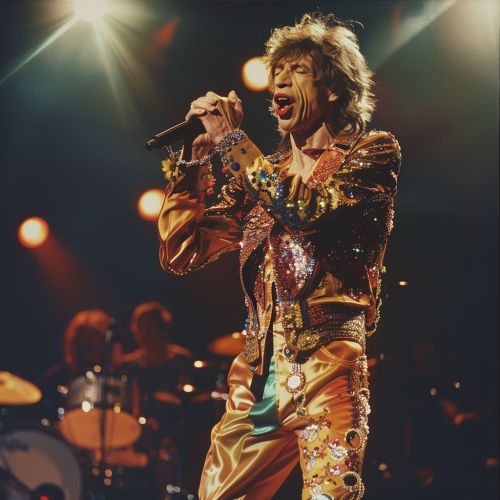Mick Jagger: Difference between revisions
(Created page with "== Early Life and Education == Michael Philip Jagger, known professionally as Mick Jagger, was born on July 26, 1943, in Dartford, Kent, England. He is the eldest son of Basil Fanshawe "Joe" Jagger, a physical education teacher, and Eva Ensley Mary Scutts, a hairdresser. Jagger's early life was marked by a strong emphasis on education and discipline, influenced by his father's profession. He attended Wentworth Primary School, where he first met Keith Richards, who would...") |
No edit summary |
||
| Line 14: | Line 14: | ||
The band's success continued with albums such as "Out of Our Heads" (1965), "Aftermath" (1966), and "Between the Buttons" (1967). These albums showcased the band's evolving musical style, incorporating elements of rock, blues, and psychedelia. Jagger's charismatic stage presence and distinctive voice became central to the band's identity. | The band's success continued with albums such as "Out of Our Heads" (1965), "Aftermath" (1966), and "Between the Buttons" (1967). These albums showcased the band's evolving musical style, incorporating elements of rock, blues, and psychedelia. Jagger's charismatic stage presence and distinctive voice became central to the band's identity. | ||
[[Image:Detail-92611.jpg|thumb|center|Mick Jagger performing on stage, wearing a flamboyant outfit, with a microphone in hand.|class=only_on_mobile]] | |||
[[Image:Detail-92612.jpg|thumb|center|Mick Jagger performing on stage, wearing a flamboyant outfit, with a microphone in hand.|class=only_on_desktop]] | |||
== Musical Evolution and Experimentation == | == Musical Evolution and Experimentation == | ||
Latest revision as of 13:04, 18 June 2024
Early Life and Education
Michael Philip Jagger, known professionally as Mick Jagger, was born on July 26, 1943, in Dartford, Kent, England. He is the eldest son of Basil Fanshawe "Joe" Jagger, a physical education teacher, and Eva Ensley Mary Scutts, a hairdresser. Jagger's early life was marked by a strong emphasis on education and discipline, influenced by his father's profession. He attended Wentworth Primary School, where he first met Keith Richards, who would later become his bandmate in The Rolling Stones.
Jagger's academic journey continued at Dartford Grammar School, where he excelled in sports and academics. His passion for music began to surface during his teenage years, influenced by the burgeoning rock and roll scene. In 1960, Jagger enrolled at the London School of Economics (LSE), intending to pursue a career in business or politics. However, his growing involvement in the music scene soon overshadowed his academic pursuits.
Formation of The Rolling Stones
In 1962, Jagger, along with Keith Richards and Brian Jones, formed The Rolling Stones. The band's early lineup also included pianist Ian Stewart, bassist Bill Wyman, and drummer Charlie Watts. The Rolling Stones quickly gained a reputation for their energetic live performances and rebellious image, which contrasted sharply with the clean-cut image of The Beatles.
The band's early repertoire consisted mainly of blues covers, heavily influenced by American blues artists such as Muddy Waters and Howlin' Wolf. Their first single, a cover of Chuck Berry's "Come On," was released in 1963 and achieved moderate success. However, it was their second single, a cover of Lennon-McCartney's "I Wanna Be Your Man," that propelled them to greater fame.
Rise to Fame
The Rolling Stones' rise to fame was marked by a series of successful singles and albums in the mid-1960s. Their first major hit, "(I Can't Get No) Satisfaction," released in 1965, became an anthem of the counterculture movement and solidified their status as rock icons. The song's distinctive riff, played by Richards, and Jagger's provocative lyrics and vocal delivery, became defining elements of the band's sound.
The band's success continued with albums such as "Out of Our Heads" (1965), "Aftermath" (1966), and "Between the Buttons" (1967). These albums showcased the band's evolving musical style, incorporating elements of rock, blues, and psychedelia. Jagger's charismatic stage presence and distinctive voice became central to the band's identity.


Musical Evolution and Experimentation
The late 1960s and early 1970s marked a period of musical experimentation for The Rolling Stones. Albums such as "Beggars Banquet" (1968), "Let It Bleed" (1969), and "Sticky Fingers" (1971) showcased the band's ability to blend rock, blues, country, and gospel influences. Jagger's songwriting partnership with Richards, often referred to as "The Glimmer Twins," produced some of the band's most enduring hits during this period.
The band's 1972 album, "Exile on Main St.," is widely regarded as one of their masterpieces. Recorded in a rented villa in the south of France, the album's raw and eclectic sound reflected the band's hedonistic lifestyle and creative peak. Jagger's lyrics on tracks such as "Tumbling Dice" and "Rocks Off" captured the spirit of the era, blending personal introspection with social commentary.
Solo Career and Side Projects
In addition to his work with The Rolling Stones, Jagger has pursued a solo career and various side projects. His first solo album, "She's the Boss," was released in 1985 and featured collaborations with prominent musicians such as Jeff Beck and Pete Townshend. The album received mixed reviews but achieved commercial success.
Jagger's subsequent solo albums, including "Primitive Cool" (1987), "Wandering Spirit" (1993), and "Goddess in the Doorway" (2001), showcased his versatility as a musician and songwriter. He has also collaborated with other artists, including David Bowie on the hit single "Dancing in the Street" and Michael Jackson on "State of Shock."
Acting Career
In addition to his musical endeavors, Jagger has pursued an acting career, appearing in several films and television shows. His first major role was in the 1970 film "Performance," directed by Donald Cammell and Nicolas Roeg. Jagger's portrayal of a reclusive rock star received critical acclaim and showcased his acting talent.
Jagger has also appeared in films such as "Ned Kelly" (1970), "Freejack" (1992), and "The Man from Elysian Fields" (2001). His performances have been praised for their intensity and charisma, although his acting career has not achieved the same level of success as his music career.
Personal Life
Jagger's personal life has been the subject of extensive media coverage. He has been married twice, first to Bianca Pérez-Mora Macias from 1971 to 1978, and then to Jerry Hall from 1990 to 1999. Jagger has eight children with five different women, including model and actress Jerry Hall and fashion designer L'Wren Scott.
Jagger's relationships and lifestyle have often been characterized by their tumultuous nature. His high-profile romances and extravagant lifestyle have made him a frequent subject of tabloid headlines. Despite this, Jagger has maintained a relatively private personal life, focusing on his music and family.
Legacy and Influence
Mick Jagger's influence on rock and roll and popular culture is immeasurable. As the frontman of The Rolling Stones, he has helped shape the sound and image of rock music for over five decades. Jagger's distinctive voice, charismatic stage presence, and provocative lyrics have made him one of the most iconic figures in music history.
Jagger's contributions to music have been recognized with numerous awards and honors, including induction into the Rock and Roll Hall of Fame in 1989 and the UK Music Hall of Fame in 2004. He was knighted by Queen Elizabeth II in 2003 for his services to music.
Philanthropy and Activism
Throughout his career, Jagger has been involved in various philanthropic and activist endeavors. He has supported numerous charitable organizations, including the Prince's Trust, the Red Cross, and the Elton John AIDS Foundation. Jagger has also been an advocate for environmental causes, supporting initiatives to combat climate change and protect endangered species.
Jagger's activism extends to his music, with songs such as "Street Fighting Man" and "Gimme Shelter" addressing social and political issues. His commitment to using his platform for positive change has earned him respect and admiration from fans and peers alike.
See Also
- The Rolling Stones
- Keith Richards
- Rock and Roll Hall of Fame
- Blues Music
- Psychedelic Rock
- British Invasion
